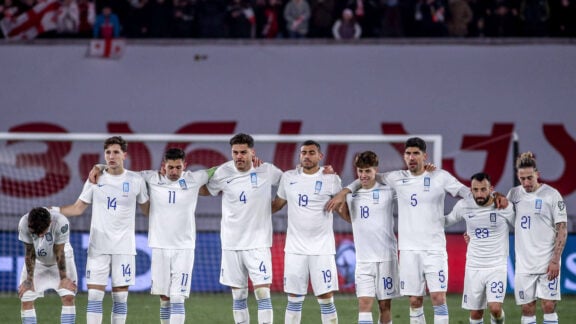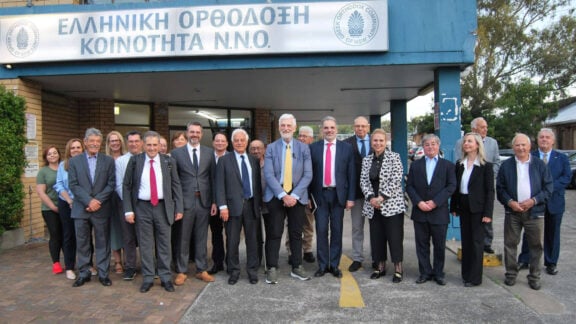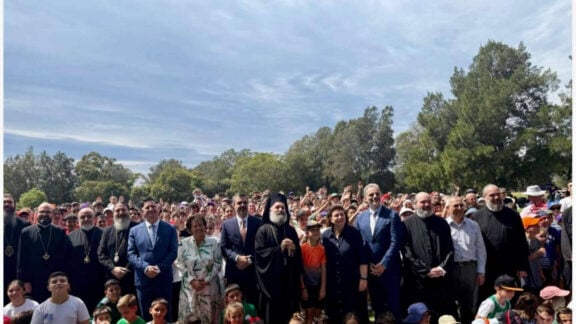As one generation of the Greek Australian community succeeds the next, we are rapidly losing the living memory carried by those who migrated to Australia in the 1940s, ’50s, ’60s and even the ’70s.
These are the people who, arriving by the thousands to Australian shores, laid the foundations for the Greek presence in the Antipodes—building a second Greece that flourished across every field of life.
How can this invaluable treasure of memory be preserved before it is swept away by the tide of time? The answer: through recording the personal stories of our elder migrants.

That’s the mission of the project “Our People, Their Stories” , a living archive of oral history launched to document the lives and legacies of first- and second-generation Greek Australians. These audiovisual stories are hosted at www.opts.org.au, where visitors can watch and listen to bilingual video stories and podcasts.
From time to time, Neos Kosmos will share highlights from some of the stories already recorded. Today, we begin with the life of Olga Kanitsaki—a deeply human and powerful narrative that reveals the wounds of civil war, the courage of a generation, and one woman’s devotion to caring for others.

A childhood in war-torn Crete
Born in 1940 in the mountainous village of Prases, Kissamos in Chania, Crete, Olga grew up surrounded by fear, loss, and a personal family tragedy that would shape her life.
She was the youngest of eight children in a middle-class family that lived off their land and business ventures. Her eldest brother, Giorgos, met a tragic end in 1949—ambushed by guerrilla fighters while returning to the village by bus to attend an engagement.
“They were lying in wait… five people were killed that day. My brother was one of them,” she recalls, her voice trembling. “It was horrible—I still remember it like it was yesterday.”
The tragedy didn’t end there. Not long after, under the cover of night, guerrillas set fire to their family home. Olga’s mother fled with her in her arms. The flames destroyed not only their roof, but the dreams of a lifetime. Despite the pain and political division, the villagers came together to help in any way they could.
Her father, a progressive man with land and an olive press, had refused to send his son to war—something the family believes led to the tragedy. “Giorgos’ death devastated him. He couldn’t bear it—he died a few years later,” Olga said. “It was as though he carried the weight of all that sorrow with him.”
Yet despite the unbearable loss, her mother responded with dignity and forgiveness. “She always told me that God is the only judge, and that love must triumph over hate.”

Childhood innocence in a divided world
Olga remembers growing up in a country torn by political division. “We were just children… I once asked a friend if she would kill me if the guerrillas ordered her to. She said ‘yes’.” That moment—where innocence collided with the brutal reality of violence—left a deep scar.
But many years later, Olga carries no hatred. Instead, with the wisdom of age and experience, she speaks of the tragedy of division and sends a message of reconciliation to future generations.

The decision to leave and the dream of freedom
By the late 1950s, Olga was yearning for a better future. Life in the provinces was especially harsh for women, who often felt invisible. She initially took up dressmaking like her sister—not out of passion, but necessity.
When she began hearing stories about Australia—from strangers passing through the village and films she watched—something sparked in her. The idea of “education” took root in her mind—not just to earn a living, but to build a better life.
Her brother Manolis was the first to apply for migration. Though hesitant at first, he eventually sent her an invitation, and Olga made the decision to leave, despite her fears and the looming unknown.

A farewell and a journey into the unknown
In 1961, Olga tearfully said goodbye to her mother—the woman who had raised her with love and faith. “She was in black, crying. She told me, ‘God be with you, my child. Write to me,’ though she didn’t know how to write,” Olga remembers. She threw a black stone behind her—a symbolic gesture that she wouldn’t return.
The voyage lasted four weeks aboard the Patris. Though originally bound for Perth, a cyclone diverted the ship to Melbourne. While at sea, Olga assisted the ship’s doctor in caring for sick passengers—her natural inclination to help others already showing.

Hardship, language barriers, and the will to survive
Life in Australia was not easy. With only a suitcase and a few clothes, Olga found herself in a foreign land, where the language and customs were unfamiliar. She stayed with her brother in Westgarth and took a job at a food factory, waking early to peel onions.
She faced danger too. In one terrifying incident, she narrowly escaped an attempted assault. “I was strong from Greece—I had worked in the fields. I wasn’t afraid,” she said, though the experience taught her not to trust strangers easily.
Ironically, she was later fired from a job for speaking English—a paradox that revealed just how challenging integration could be. But Olga didn’t give up. With a dictionary in hand, she began learning English—word by word, lesson by lesson.

A calling to care: Nursing and compassion
Caring for others was her true calling. She began volunteering at the Children’s Hospital, cleaning and assisting in any way she could. Her love of nursing led her to further training and study.
Learning the language was a major hurdle, but Olga found support from Vivian Bullwinkel, the legendary matron and war heroine, who taught her that strength of spirit and dedication could overcome any obstacle.
Olga saw firsthand the challenges faced by migrant patients—many of whom couldn’t speak English or communicate their needs. She became a bridge between worlds, helping patients feel seen, understood, and cared for.
Beyond her hospital work, Olga became active in supporting newly arrived migrants, helping them navigate their fears and dreams in a new country. To her, language and cultural understanding were vital for healing and integration.
Her compassion and dedication earned her promotions—from nurse to supervisor—gaining the respect and trust of her colleagues.

Looking back, Olga recognises that every hardship shaped her strength. Her passion for nursing never faded, and her desire to give to others kept her heart full.
She also kept her language and traditions alive, embracing her new country with respect and love while never forgetting her roots.
Her story is not only a testimony to the suffering of civil war and migration—it is a luminous example of resilience, dignity, and humanity. A message of hope and reconciliation for generations to come.
You can watch Olga Kanitsaki’s full story here









